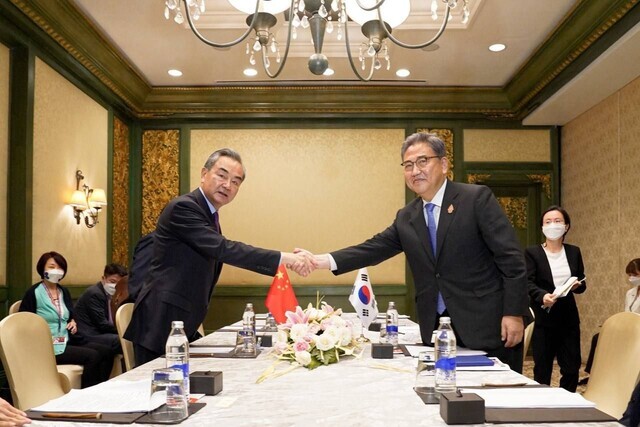hankyoreh
Links to other country sites 다른 나라 사이트 링크
Foreign ministers of S. Korea, China agree to bolster strategic communication

South Korean Foreign Minister Park Jin and Chinese Foreign Minister Wang Yi agreed to strengthen strategic communication between their two countries in a meeting in Bali, Indonesia, held on the sidelines of a gathering of G20 foreign ministers. Wang reportedly didn’t mention Korean President Yoon Suk-yeol’s recent participation in a NATO summit.
In their meeting on Thursday afternoon, which lasted a little over 50 minutes, Park and Wang agreed to regularly communicate with each other, including in person, and to activate channels of strategic communication, including strategic dialogue between vice foreign ministers in the second half of the year, Korea’s Ministry of Foreign Affairs said the same day.
The two sides agreed to communicate closely to arrange for Park to visit China very soon and for Wang to visit Korea before the end of the year, the ministry added.
“For Korea and China to be able to continue developing a healthy and mature bilateral relationship over the coming 30 years, we need to be good partners who cooperate on an equal footing while building mutual respect and trust,” Park said during the meeting on Thursday.
Korea and China will mark the 30th anniversary of their establishment of diplomatic relations on Aug. 24.
“The new government [of Korea] places importance on the universal values and norms of the international community. We will actively cooperate with the international community to defend freedom, peace, human rights and the rule of law. We hope that the development of Korea-China relations will also be based on those universal values and norms,” Park also said.
The Korean foreign minister continued by proposing to restore and expand person-to-person exchange between the two countries to “prepare for the post-COVID-19 era by activating cultural exchange and resuming and expanding flights.” Park also suggested the two sides “increase meaningful cooperation in the areas of the economy, culture, and the environment (by addressing particulate matter in the air) in order to make Korea-China relations even more mature and healthy.”
The ministry quoted Wang’s response as follows: “On the 30th anniversary of the establishment of diplomatic relations, we hope to continue expanding cooperation in various areas, including culture, person-to-person exchange and the economy, with Korea, an important neighbor to which we are inextricably tied. We should continue strengthening bilateral communication and cooperation on the regional and international stage.”
According to the ministry, Park also addressed the threat posed by North Korea’s nuclear weapon and missile programs, including the fact that Pyongyang has essentially completed preparations for a seventh nuclear test.
The ministry said that Park had “asked the Chinese to play a constructive role to enable North Korea to return to dialogue and immediately suspend provocations that exacerbate the situation on the Korean Peninsula and the region.” He also proposed that South Korea and China “remain in close communication in regard to the North Korean nuclear issue.”
This is the first time South Korea and China’s foreign ministers have met in person since Yoon became president of Korea. Their first official meeting took the form of a video conference on May 16, immediately after Park took office.
“Thirty years ago, the two countries got rid of the shackles of the Cold War and opened a new chapter of cooperation. Today, it serves the fundamental interests of China and the ROK to keep the region open and inclusive, guard against the risk of a new Cold War, and oppose bloc confrontation,” Wang said in that virtual meeting.
By Jung In-hwan, staff reporter
Please direct questions or comments to [english@hani.co.kr]

Editorial・opinion
![[Editorial] Yoon must halt procurement of SM-3 interceptor missiles [Editorial] Yoon must halt procurement of SM-3 interceptor missiles](https://flexible.img.hani.co.kr/flexible/normal/500/300/imgdb/child/2024/0501/17145495551605_1717145495195344.jpg) [Editorial] Yoon must halt procurement of SM-3 interceptor missiles
[Editorial] Yoon must halt procurement of SM-3 interceptor missiles![[Guest essay] Maybe Korea’s rapid population decline is an opportunity, not a crisis [Guest essay] Maybe Korea’s rapid population decline is an opportunity, not a crisis](https://flexible.img.hani.co.kr/flexible/normal/500/300/imgdb/original/2024/0430/9417144634983596.jpg) [Guest essay] Maybe Korea’s rapid population decline is an opportunity, not a crisis
[Guest essay] Maybe Korea’s rapid population decline is an opportunity, not a crisis- [Column] Can Yoon steer diplomacy with Russia, China back on track?
- [Column] Season 2 of special prosecutor probe may be coming to Korea soon
- [Column] Park Geun-hye déjà vu in Yoon Suk-yeol
- [Editorial] New weight of N. Korea’s nuclear threats makes dialogue all the more urgent
- [Guest essay] The real reason Korea’s new right wants to dub Rhee a founding father
- [Column] ‘Choson’: Is it time we start referring to N. Korea in its own terms?
- [Editorial] Japan’s rewriting of history with Korea has gone too far
- [Column] The president’s questionable capacity for dialogue
Most viewed articles
- 1Months and months of overdue wages are pushing migrant workers in Korea into debt
- 2At heart of West’s handwringing over Chinese ‘overcapacity,’ a battle to lead key future industries
- 3[Editorial] Yoon must halt procurement of SM-3 interceptor missiles
- 4Trump asks why US would defend Korea, hints at hiking Seoul’s defense cost burden
- 5Fruitless Yoon-Lee summit inflames partisan tensions in Korea
- 6Dermatology, plastic surgery drove record medical tourism to Korea in 2023
- 71 in 3 S. Korean security experts support nuclear armament, CSIS finds
- 8[Editorial] New weight of N. Korea’s nuclear threats makes dialogue all the more urgent
- 9First meeting between Yoon, Lee in 2 years ends without compromise or agreement
- 10Under conservative chief, Korea’s TRC brands teenage wartime massacre victims as traitors